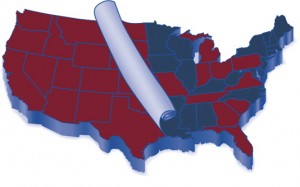 The National Center for Science Education is warning that a bill introduced in the Colorado House of Representatives on January 16, HB13-1089 (pdf), called the “Academic Freedom Act,” is really a trojan horse anti-science bill. The bill directs teachers “to create an environment that encourages students to intelligently and respectfully explore scientific questions and learn about scientific evidence related to biological and chemical evolution, global warming, and human cloning.” It sounds innocent enough, but such bills use an “academic freedom” guise to tacitly permit teachers to misinform students by allowing the teaching of creationism as a scientifically valid alternative to evolution, or by allowing teachers to misrepresent evolution as being scientifically controversial. The last time such an anti-evolution bill was introduced in Colorado was in 1972, when a lawmakers tried to put a measure on the ballot that would have allowed “all students and teachers academic freedom of choice as to which of these two theories, creation of evolution, they wish to choose.” That measure never made it onto the ballot. All of the primary sponsors and co-sponsors of Colorado’s 2013 “Academic Freedom Act” in both the House and the Senate are Republicans. These tricky, shifting strategies state and local school boards, state legislatures and teachers are using to undermine the teaching of scientific subjects like evolution, climate change and cloning are described in depth an article published in a September, 2010 article in the Annual Review of Genomics and Human Genetics titled Dispatches from the Evolution Wars: Shifting Tactics and Expanding Battlefields.
The National Center for Science Education is warning that a bill introduced in the Colorado House of Representatives on January 16, HB13-1089 (pdf), called the “Academic Freedom Act,” is really a trojan horse anti-science bill. The bill directs teachers “to create an environment that encourages students to intelligently and respectfully explore scientific questions and learn about scientific evidence related to biological and chemical evolution, global warming, and human cloning.” It sounds innocent enough, but such bills use an “academic freedom” guise to tacitly permit teachers to misinform students by allowing the teaching of creationism as a scientifically valid alternative to evolution, or by allowing teachers to misrepresent evolution as being scientifically controversial. The last time such an anti-evolution bill was introduced in Colorado was in 1972, when a lawmakers tried to put a measure on the ballot that would have allowed “all students and teachers academic freedom of choice as to which of these two theories, creation of evolution, they wish to choose.” That measure never made it onto the ballot. All of the primary sponsors and co-sponsors of Colorado’s 2013 “Academic Freedom Act” in both the House and the Senate are Republicans. These tricky, shifting strategies state and local school boards, state legislatures and teachers are using to undermine the teaching of scientific subjects like evolution, climate change and cloning are described in depth an article published in a September, 2010 article in the Annual Review of Genomics and Human Genetics titled Dispatches from the Evolution Wars: Shifting Tactics and Expanding Battlefields.
Corruption, Elections, Equal rights, Ethnic/Minority, politics
Republicans’ REDMAP Strategy to Skew Future Elections in Their Favor
by • • 0 Comments

Voter ID wasn’t enough; Republicans still tinkering with election processes to disadvantage voters on the other side
Republicans, finding themselves less able to win elections on the merits of their candidates and policy positions, are continuing to tinker with election processes at the state level to disadvantage voters who disagree with their policies and dislike their candidates. In 2010 and 2011, Republicans worked frenetically in state legislatures to pass so-called “voter ID” laws, which, just prior to the election, were officially outed as a strategy to make voting harder for the people most likely to vote against their candidates: African Americans, the elderly, the poor, students and those with disabilities. As voter ID laws were increasingly discredited and blocked by the courts, Republicans started working on a new strategy: REDMAP, short for “Redistricting Majority Project,” an effort to skew the redistricting process to assure Republicans maintain their majority in the U.S. House of Representatives even though more Democrats than Republicans are now casting ballots across the country. The GOP’s REDMAP strategy involves a plan to win control of state legislatures. Once they achieve that, they initiate an aggressive gerrymandering campaign to redraw the states’ electoral maps and create districts that are completely safe for Republicans. But beyond eliminating competitive elections in Congressional races, a new part of the GOP’s strategy is to change the rules about how the states apportion their electoral college votes. The new strategy will magnify the effect of Republican votes in the Electoral College in future elections. The GOP wants to change the current winner-take-all rule for apportioning electoral college votes to instead apportioning electoral votes based on the winner in each individual Congressional district within the state. The change would hand beleaguered Republicans a huge process advantage over Democrats. As an example, if the GOP’s hoped-for rule had been in place in Pennsylvania in the November, 2012 election, for example, Mitt Romney would have won 13 of that state’s 20 electoral college votes, even though Obama won the state with 52 percent of the popular vote.
Main Source: Huffington Post, January 17, 2012
Corporations, Economics, Energy, Environment, Grassroots advocacy
Grassroots Group Succeeds in Peeling Away Heartland Institute’s Funding
by • • 0 Comments
 A group called Forecast the Facts is leading a campaign to peel away corporate funders who give money the Heartland Institute, a prominent think tank that has been a leader in the effort to deny climate science. Heartland is known for its harsh and divisive anti-climate change PR tactics, like running cringe-inducing billboards along major highways that liken people who believe in climate change to mass murderers like Charles Manson and the Unabomber, Ted Kaczyinski. The Heartland Institute has flourished through funding from large corporations and industries that have a stake in climate change denial, including ExxonMobil, The U.S. Chamber of Commerce, Murray Energy Corporation, Altria/Philip Morris, Microsoft, General Motors and biotech companies like Amgen and Bayer. Forecast the Facts’ grassroots effort to peel away funders looks like it’s paying off, too. The group calculated Heartland’s corporate and trade association funding for 2012 based on the amounts Heartland projected they would take in in their 2012 fundraising plan. Of $2.3 million in projected funding, Forecast the Facts has succeeded in getting corporations to withdraw $1.3 million, leaving about $990,000 remaining. More than 150,000 people have weighed in with various corporations through the project and urged them to pull their funding from Heartland. On its website, Forecast the Facts lists Heartland’s remaining corporate funders, the approximate amount the companies donate to the think tank, and phone numbers at each corporation that people can call to ask the company to stop funding Heartland.
A group called Forecast the Facts is leading a campaign to peel away corporate funders who give money the Heartland Institute, a prominent think tank that has been a leader in the effort to deny climate science. Heartland is known for its harsh and divisive anti-climate change PR tactics, like running cringe-inducing billboards along major highways that liken people who believe in climate change to mass murderers like Charles Manson and the Unabomber, Ted Kaczyinski. The Heartland Institute has flourished through funding from large corporations and industries that have a stake in climate change denial, including ExxonMobil, The U.S. Chamber of Commerce, Murray Energy Corporation, Altria/Philip Morris, Microsoft, General Motors and biotech companies like Amgen and Bayer. Forecast the Facts’ grassroots effort to peel away funders looks like it’s paying off, too. The group calculated Heartland’s corporate and trade association funding for 2012 based on the amounts Heartland projected they would take in in their 2012 fundraising plan. Of $2.3 million in projected funding, Forecast the Facts has succeeded in getting corporations to withdraw $1.3 million, leaving about $990,000 remaining. More than 150,000 people have weighed in with various corporations through the project and urged them to pull their funding from Heartland. On its website, Forecast the Facts lists Heartland’s remaining corporate funders, the approximate amount the companies donate to the think tank, and phone numbers at each corporation that people can call to ask the company to stop funding Heartland.
Corruption, Education, Equal rights, Ethics, Human rights, Religion
Praise Jesus and Pass the Taxpayer-Funded Football
by • • 0 Comments

Logo of the Fellowship of Christian Athletes, whose mission is to use school athletics as a platform to spread Christian evangelism
Christian evangelicals are hard at work recruiting young athletes into Christianity in publicly-funded schools all across the country, and taxpayers are footing the bill. The injection of Jesus into school athletics is being carried out by the Fellowship of Christian Athletes (FCA), a Christian group that encourages and rewards school sports coaches for using their influential positions to spread Christianity among youth.
For those who are unfamiliar with FCA, it is a Christian religious group whose existence is dedicated to turning school athletic departments into missionaries for Christ. FCA’s website states, “The purpose of [FCA’s] Campus Ministry…has been to share the Gospel of Jesus Christ with the lost and to seek and grow a mature follower of Jesus Christ. The ‘win’ of Campus Ministry is to see campuses impacted for Jesus Christ through the influence of coaches and athletes.” An answer to the question of “What is FCA?” on the group’s website states, “Since 1954, FCA has been challenging coaches and athletes on the professional, college, high school, junior high and youth levels to use the powerful medium of athletics to impact the world for Jesus Christ.” FCA also encourages coaches to conduct Bible studies on campus. The group is open about its use of the platform of athletics to spread Christian “evangelism, discipleship, outreach and fellowship.” One of FCA’s corporate sponsors is Chick-Fil-A, the fast-food restaurant chain whose president, Dan Cathy, expressed strong views against same-sex marriage in a July, 2012 interview in the Biblical Recorder.
Advertising, Consumer advocacy, Health, Marketing, Media, Propaganda, Tobacco, Women
How “Breast Cancer Awareness” Campaigns Hurt
by • • 0 Comments
 Breast Cancer Awareness month comes around every October, a now-familiar time when pink ribbons adorn department stores, grocery stores, gas stations, shopping malls and many other places. But this particular big “awareness” push may have reached its peak and maxed out its usefulness. By now most everyone is aware of breasts and breast cancer, but ignorance still abounds in other cancer areas. For example, people are still woefully unaware that lung cancer kills twice as many women each year than breast cancer. More women every year in the U.S. die from lung cancer than from breast, uterine, and ovarian cancers combined. In 2009 alone, 31,000 more women died of lung cancer than breast cancer. So why aren’t there aren’t any ribbons, rubber bracelets, theme-colored products, corporate promotions, colored car magnets, festivals or fundraisers to make people aware of lung cancer’s devastating toll, or to support lung cancer victims or raise money for a cure?
Breast Cancer Awareness month comes around every October, a now-familiar time when pink ribbons adorn department stores, grocery stores, gas stations, shopping malls and many other places. But this particular big “awareness” push may have reached its peak and maxed out its usefulness. By now most everyone is aware of breasts and breast cancer, but ignorance still abounds in other cancer areas. For example, people are still woefully unaware that lung cancer kills twice as many women each year than breast cancer. More women every year in the U.S. die from lung cancer than from breast, uterine, and ovarian cancers combined. In 2009 alone, 31,000 more women died of lung cancer than breast cancer. So why aren’t there aren’t any ribbons, rubber bracelets, theme-colored products, corporate promotions, colored car magnets, festivals or fundraisers to make people aware of lung cancer’s devastating toll, or to support lung cancer victims or raise money for a cure?
Because lungs just aren’t as effective as selling crap for marketers, that’s why.
Grassroots advocacy, Gun violence, Lobbying, Safety, Security, Violence
They Said It Couldn’t Be Done: NY State Passes Comprehensive Gun Safety Bill
by • • 0 Comments

Sandy Hook victims
With lightening speed for a state legislature, New York became the first state to pass a comprehensive gun safety bill since the massacre December 14, 2012 at Newtown, Connecticut. New York’s gun control bill, passed and signed today, is the toughest in the nation. It expands the definition of “assault weapon” to include semiautomatic weapons to include those with just one feature commonly associated with military weapons, like a bayonet mount, flash suppressor or pistol grip. Previously the definition required two features. New York’s bill also revokes or suspends gun licenses held by people whom mental health experts determine to be a danger to society. The new law limits magazines to just seven rounds of ammunition instead of ten, and provides for enhanced monitoring of ammunition purchases to flag high-volume buyers. Gun licenses must be re-certified every five years. (They used to never expire.) The law increases penalties for illegal gun possession and for using a gun against emergency responders. “Common sense can win,” said New York Governor Andrew Cuomo as he signed the bill, less than an hour the New York State Assembly passed it by a vote of 104 to 43 . “You can overpower extremists with intelligence and with reason and common sense,” Cuomo said. The National Rifle Association called the law “draconian,” and said it was passed “under a veil of secrecy in the dark of night.” The bill passed on the second day of New York state’s 2013 legislative session.
Main source: Los Angeles Times, August 15, 2012
Advertising, Corporations, Ethics, Gun violence, Lobbying, Media, politics, Propaganda, Safety, Security, Violence
NRA Puts President Obama’s Kids in the Political Crosshairs
by • • 0 Comments
The National Rifle Association (NRA) posted a 35 second Internet ad called “Stand and Fight” that takes aim at President Obama’s children over the issue of gun safety regulations. The ad accuses President Obama of being an “elitist hypocrite” for accepting armed secret service protection for his children, Sasha, age 11, and Malia, age 14, while other children attend school without armed guards. The voiceover in the ad asks “Are the president’s kids more important that yours? Then why is he skeptical about putting armed security in our schools when HIS kids are protected by armed guards at THEIR school? Mr. Obama demands the wealthy pay their fair share of taxes, but he’s just another elitist hypocrite when it comes to a fair share of security. Protection for their kids and gun-free zones for ours.” There were reports on MSNBC that the NRA pulled the ad almost as quickly as they posted it, but as of this evening the ad was still visible at the NRA’s new website, NRAStandandFight.com.
animal abuse, Corporations, Ethics, politics, Worker advocacy
Trojan Horse Ag-Gag Bill Introduced in New Hampshire
by • • 0 Comments

Chickens in a battery cage (Wikimedia image)
The Humane Society of the United States (HSUS) is sounding alarm bells about a bill introduced in New Hampshire’s House of Representatives that requires people who photograph or make video recordings of cruelty against livestock to report it to police within 24 hours and turn over their unedited video or photos to authorities. So what’s wrong with that? And why does the HSUS oppose it? After all, it sounds like it’s aimed at exposing animal abuse, right? Nope. It’s a particularly tricky form of an industry-crafted “Ag-Gag” bill meant to stifle reporting on animal cruelty in commercial livestock operations. How? When whistleblowers expose cruelty at commercial animal enterprises, a common excuse put forth by business owners is that the abuse was a one-off occurrence or a single event perpetrated by a rogue employee who has, of course, since been fired. People working to expose animal abuse in big agribusiness enterprises have learned that they must document repeated instances of cruelty in order to make a solid case against the company that will hold up in court. Such high-quality evidence is animal advocates’ only leverage to try and stop to the abuse. If people are required to turn over a video recording of a single instance of abuse the same day it was taken, it would make it virtually impossible to document a pattern of abuse to the extent necessary to make a tight enough case to stop it.
animal abuse, Consumer advocacy, Ethics, Grassroots advocacy, Lobbying, politics, Safety, Secrecy
Agribusiness Pushes “Ag-Gag” Laws Aimed at Keeping Animal Abuse Secret
by • • 0 Comments
Whistleblowing employees in the food industry have been credited with exposing horrible instances of animal abuse, unsafe working conditions, and environmental and public health violations on industrial factory farms by filming these conditions and exposing them to the public. But instead of fixing the problems these workers expose, the agribusiness industry is responding by pushing through laws that effectively block the pubic from finding out about these abuses in the first place. These whistleblower suppression, or “ag-gag” bills, criminalize taking photographs or video recordings at factory farms without permission, ban the distribution of such photos or videos and make it a crime to take a job at a commercial farm operation for the purpose of exposing what goes on there. These industry-backed bills would stop undercover activity like that used by the Humane Society of the United States (HSUS) in 2008 to expose animal cruelty at a Vermont slaughter plant that led to a felony conviction and the plant’s closure, and a landmark investigation at a cow slaughter plant the same year that prompted the largest meat recall in U.S. history and spurred a new federal law banning the slaughter of “downer” cattle.
For more info: What are Agribusiness Groups Trying to Hide with “Ag-Gag” Bills? Humane Society of the United States, January 18, 2012
Consumer advocacy, Corporations, Ethics, Food, Health, Lies, Safety, Worker advocacy
FDA- Approved “Buttery” Food Flavoring Makes People Sick
by • • 0 Comments
 A chemical flavoring used to create that delicious, buttery flavor in microwave popcorn, when heated, can cause a life-threatening, irreversible obstructive lung disease called bronchiolitis obliterates. The chemical, called diacetyl, was first found make popcorn manufacturing workers sick in 1985, after two workers employed in a factory where the flavoring was used developed a rare lung disease. The National Institute of Occupational Safety and Health (NIOSH), tested the air in the employees’ workplace, found a high concentration of diacetyl, and confirmed a link between workers’ exposure to the chemical and their reduced lung function. Since then, hundreds of workers have reported becoming sick after working around the chemical. According to NIOSH, diacetyl is used extensively in the flavoring and food manufacturing industries. Diacetyl doesn’t just affect factory workers, either. Wayne Watson of Denver, Colorado, ate two bags of microwave popcorn every day for ten years and developed the lung disease now known as “popcorn lung.” In September, 2012, he was awarded $7.2 million in a lawsuit against Gilster-Mary Lee Corporation, which made the popcorn, and the Kroger and Dillon Companies, the grocery store chains that sold it. In his suit, Watson pointed out that neither the manufacturer nor the grocery stores warned customers that diacetyl — also recently linked to Alzheimer’s disease — was dangerous. In December, 2012, Sensient, a flavoring company in Indianapolis, Indiana, agreed to pay a fine for violating Indiana OSHA workplace standards for use of diacetyl. The company also agreed to reduce its use of the chemical. In 2004, a jury awarded another couple, Eric and Cassandra Peoples of Joplin, Missouri, a total of $20 million for health injuries they incurred due to workplace exposure to the chemical. So far, food manufacturers have paid out over $100 million in damages to workers who were exposed to the chemical and got sick. Despite this, FDA still lists the chemical as safe on its website.
A chemical flavoring used to create that delicious, buttery flavor in microwave popcorn, when heated, can cause a life-threatening, irreversible obstructive lung disease called bronchiolitis obliterates. The chemical, called diacetyl, was first found make popcorn manufacturing workers sick in 1985, after two workers employed in a factory where the flavoring was used developed a rare lung disease. The National Institute of Occupational Safety and Health (NIOSH), tested the air in the employees’ workplace, found a high concentration of diacetyl, and confirmed a link between workers’ exposure to the chemical and their reduced lung function. Since then, hundreds of workers have reported becoming sick after working around the chemical. According to NIOSH, diacetyl is used extensively in the flavoring and food manufacturing industries. Diacetyl doesn’t just affect factory workers, either. Wayne Watson of Denver, Colorado, ate two bags of microwave popcorn every day for ten years and developed the lung disease now known as “popcorn lung.” In September, 2012, he was awarded $7.2 million in a lawsuit against Gilster-Mary Lee Corporation, which made the popcorn, and the Kroger and Dillon Companies, the grocery store chains that sold it. In his suit, Watson pointed out that neither the manufacturer nor the grocery stores warned customers that diacetyl — also recently linked to Alzheimer’s disease — was dangerous. In December, 2012, Sensient, a flavoring company in Indianapolis, Indiana, agreed to pay a fine for violating Indiana OSHA workplace standards for use of diacetyl. The company also agreed to reduce its use of the chemical. In 2004, a jury awarded another couple, Eric and Cassandra Peoples of Joplin, Missouri, a total of $20 million for health injuries they incurred due to workplace exposure to the chemical. So far, food manufacturers have paid out over $100 million in damages to workers who were exposed to the chemical and got sick. Despite this, FDA still lists the chemical as safe on its website.
Resource: U.S. Centers for Disease Control 2011 Review and Recommendation for Standard for Use of Diacetyl (pdf)
Media
Grand Junction, Colorado Daily Sentinel Wins “Worst Headline Juxtaposition” Prize
by • • 1 Comment
Corruption, Ethics, Human rights, Religion, Religious hypocrisy, Secularism
Oklahoma Judge Orders Church as Punishment for Manslughter
by • • 0 Comments
 Oklahoma 17 year old Tyler Alred pled guilty to first-degree manslaughter after drinking and driving last December 3 and getting into a vehicular crash that killed his 16 year old passenger, but instead of sentencing Alred to prison, Oklahoma district judge Mike Norman sentenced Alred to complete high school, finish welding school, take drug and alcohol tests for a year, wear an alcohol monitoring bracelet and attend church for ten years. Judge Norman had sentenced people to attend church before as punishment, but never for manslaughter. The Oklahoma chapter of the American Civil Liberties Union (ACLU) cited the sentence as a clear violation of the free exercise clause of the First Amendment to the U.S. Constitution. Judge Norman himself acknowledged the sentence is illegal, but believes he can get away with it because he doesn’t think anyone will appeal it. No parties who have standing in the case are likely to object to the sentence because it keeps Alred from having to go to prison. The pastor of the church Alred has attended in the past questioned the judge’s use of church as criminal punishment, saying “What will the judge do if the young man changes his [religious] affiliation in the next few years? Will he be allowed to switch to a mosque or become an atheist?” The ACLU is particularly concerned that the judge was fully aware that the sentence he handed down was illegal, but did it anyway. Ryan Kiesel, executive director of the Oklahoma ACLU said, “The Constitution is not exercised at your discretion. You take an oath to uphold it all the time, not just sometimes.”
Oklahoma 17 year old Tyler Alred pled guilty to first-degree manslaughter after drinking and driving last December 3 and getting into a vehicular crash that killed his 16 year old passenger, but instead of sentencing Alred to prison, Oklahoma district judge Mike Norman sentenced Alred to complete high school, finish welding school, take drug and alcohol tests for a year, wear an alcohol monitoring bracelet and attend church for ten years. Judge Norman had sentenced people to attend church before as punishment, but never for manslaughter. The Oklahoma chapter of the American Civil Liberties Union (ACLU) cited the sentence as a clear violation of the free exercise clause of the First Amendment to the U.S. Constitution. Judge Norman himself acknowledged the sentence is illegal, but believes he can get away with it because he doesn’t think anyone will appeal it. No parties who have standing in the case are likely to object to the sentence because it keeps Alred from having to go to prison. The pastor of the church Alred has attended in the past questioned the judge’s use of church as criminal punishment, saying “What will the judge do if the young man changes his [religious] affiliation in the next few years? Will he be allowed to switch to a mosque or become an atheist?” The ACLU is particularly concerned that the judge was fully aware that the sentence he handed down was illegal, but did it anyway. Ryan Kiesel, executive director of the Oklahoma ACLU said, “The Constitution is not exercised at your discretion. You take an oath to uphold it all the time, not just sometimes.”
Advertising, Corporations, Ethics, Marketing, Propaganda, Violence
Bushmaster Gun Company Forced to Pull Tasteless Ad
by • • 2 Comments

A portion of Bushmaster’s tasteless online promotion. (The company has since pulled it.)
Bushmaster, the company that makes the machine gun Adam Lanza used in the Sandy Hook Elementary School massacre December 14, 2012, was forced to pull a shockingly bad ad campaign from its website that taunted men about their masculinity and portrayed them as not masculine unless they owned a gun. Bushmaster’s site quizzed men about whether they ate tofu, knew how to change a tire or had ever watched figure skating “on purpose.” If men passed the “quiz,” they would get awarded a “Man Card” that entitled them to “leave the seat up without shame.” A “Man Card” could be revoked if a man was a “coward,” a “cry baby” or found himself on a “short leash.” One part of the site said “Colin F. avoids eye contact with tough-looking 5th graders. MAN CARD REVOKED.” The ad also made it clear that a man could reclaim his manhood by buying a Bushmaster assault rifle, like the one Adam Lanza allegedly used at Newtown.
Source: Buzzfeed, December 17, 2012
Consumer advocacy, Corporations, Equal rights, Ethics, Health care, Human rights, Religion, Secularism, Women
Hobby Lobby’s Misguided Religious Activism
by • • 3 Comments

Hobby Lobby founder David Green, and his wife.
Op-Ed
A U.S. District Court court ruled in November that Hobby Lobby, a private, for-profit, national arts-and-crafts supply store chain owned by a Christian family, cannot be exempted from a government requirement that its employees’ health insurance plan cover 100% of the cost for emergency contraceptives. Hobby Lobby’s owners, who are conservative Christians, challenged a provision of the Affordable Care Act (“Obamacare”) that requires businesses provide employees with no-cost birth control through their health insurance plans. U.S. District Judge Joe Heaton of the Western District Court in Oklahoma ruled November 19 that privately-owned companies are secular, for-profit enterprises, and as such are not entitled to the the same religious rights as the individual members of the family that owns them. The Green family, owners of Hobby Lobby, have vowed to defy the Court’s ruling, and to continue to block their employees’ access to free contraception through their health insurance plans.
In his religious zeal, David Green, the owner of Hobby Lobby, is missing the point. The law entitles him and his family to their own beliefs, but Hobby Lobby’s claim that the Affordable Care Act’s contraception requirements infringe on his own personal religious liberty makes no sense.
Advertising, Consumer advocacy, Corporations, Economics, Ethics, Grassroots advocacy, Human rights, International, Lies, Marketing, Media
Expedia Uses its Clout to Crush Small, Independent Hotels
by • • 1 Comment

The owners of the Luna Blue Hotel on Mexico’s Caribbean coast reveal their experience with Expedia’s strong-arm tactics to try and ruin their business and push travelers to book at more bigger, more lucrative properties that have a more favorable relationship with the site.
Years ago, Tony and Cheri quit their jobs, left their lives in the U.S. and risked their entire life savings to pursue their dream of operating a small hotel on Mexico’s Caribbean coast. Their quaint, 18-room place, the Luna Blue Hotel, took some hits from the swine flu scare and state-side reports of central Mexico’s drug wars, but the couple vowed to hold on and get through it somehow. During that lean time, a representative of the powerhouse travel website Expedia approached the couple and offered to help them recover some of their lost business by listing their place on Expedia. The couple agreed it might be a good idea to list with the site, and signed on as an Expedia “partner.”
But almost immediately the relationship turned sour.
Consumer advocacy, Corruption, Ethics, Health, politics, Safety, Tobacco, Violence
NRA Blocks Data Collection on Public Health Impact of Guns
by • • 1 Comment
 The U.S. government has invested billions to determine the causes behind traffic fatalities and used that information to make policies that have markedly reduce traffic deaths in the United States. Government research on traffic safety has led to the widespread use of seat belts, front and side impact air bags, child safety seats and other advances that have greatly advanced road safety and reduced vehicular deaths for Americans. The number of deaths annually from firearms in the U.S. closely approximates the number of traffic fatalities — roughly 30,000 deaths per year from each. Yet there has been little research into, or advances made in reducing gun deaths. Why? Because the National Rifle Association (NRA) has long worked behind the scenes to block laws allowing the collection and dissemination of data about the impact of gun ownership on Americans’ safety. The NRA quietly pushed a provision that was inserted into the Affordable Care Act (“Obamacare”) restricting the data doctors can collect from their patients about their ownership and use of firearms. From 1986 and 1996, the U.S. Centers for Disease Control conducted peer-reviewed research into the impact of the presence of guns in people’s homes. While there is a widespread belief among gun owners that the presence of guns in their homes makes them safer, the CDC found the opposite — that having a gun in the home creates a 2.7 times greater risk of homicide and a 4.8 greater risk of suicide for the occupants. The NRA took action to prevent CDC from publicizing these results, and blocked continued funding of government research into the impact of firearms on citizen safety.
The U.S. government has invested billions to determine the causes behind traffic fatalities and used that information to make policies that have markedly reduce traffic deaths in the United States. Government research on traffic safety has led to the widespread use of seat belts, front and side impact air bags, child safety seats and other advances that have greatly advanced road safety and reduced vehicular deaths for Americans. The number of deaths annually from firearms in the U.S. closely approximates the number of traffic fatalities — roughly 30,000 deaths per year from each. Yet there has been little research into, or advances made in reducing gun deaths. Why? Because the National Rifle Association (NRA) has long worked behind the scenes to block laws allowing the collection and dissemination of data about the impact of gun ownership on Americans’ safety. The NRA quietly pushed a provision that was inserted into the Affordable Care Act (“Obamacare”) restricting the data doctors can collect from their patients about their ownership and use of firearms. From 1986 and 1996, the U.S. Centers for Disease Control conducted peer-reviewed research into the impact of the presence of guns in people’s homes. While there is a widespread belief among gun owners that the presence of guns in their homes makes them safer, the CDC found the opposite — that having a gun in the home creates a 2.7 times greater risk of homicide and a 4.8 greater risk of suicide for the occupants. The NRA took action to prevent CDC from publicizing these results, and blocked continued funding of government research into the impact of firearms on citizen safety.
Advertising, Consumer advocacy, Ethics, Health, Marketing, Pharmaceutical, Safety
New FDA-Approved Anticoagulants Have No Antidote; Patients Bleeding to Death
by • • 1 Comment

FDA allowed the new anticoagulant Pradaxa to go on the market without any known way to quickly reverse its effects.
Cardiac patients who experience atrial fibrillation are routinely prescribed anti-clotting drugs to help prevent strokes. For many years, the most popular anti-clotting agent has been warfarin, marketed as Coumadin. Warfarin is the active ingredient in rodenticides like D-Con, which work by causing rats and mice to bleed to death internally. Coumadin works by depleting the body’s level of active Vitamin K, a clotting factor present naturally in many foods. But Coumadin has major drawbacks. Patients taking it require frequent monitoring to assure they have the correct levels of the anticoagulant in their blood, and have to be careful about what they eat, because foods high in Vitamin K can alter Coumadin’s effectiveness. Recently new anti-clotting drugs have come on the market that have been hailed as major improvements over Coumadin because diet not a factor and patients taking them require little or no monitoring for blood levels. With brand names like Pradaxa (dabigatran), Xarelto (rivaroxaban) and Eliquis (apixaban), the new drugs are being hailed by investors in Big Pharma as “blockbuster” drugs, and their manufacturers are, as usual, aggressively marketing them through television ads. But these drugs can be quite costly in several ways. Pradaxa and Xarelto cost around $3,000 a year, while warfarin costs as little as $200. But a much bigger problem for patients is that there is no known antidote to the new drugs for patients who experience bleeding emergencies.
Consumer advocacy, Economics, Ethics, Pop culture
Look for This: Rounding on Restaurant Checks
by • • 0 Comments
 Next time you dine out, take a close look at your check. Restaurants are starting to round the pennies on customers’ bills up or down, usually to the nearest nickel, to avoid having to deal with pennies. Chipoltle restaurants were caught doing this without notifying customers, and when customers noticed the practice and expressed irritation, the chain added a line on the bill titled “rounding” to openly account for the missing change. They also started rounding down in diners’ favor.
Next time you dine out, take a close look at your check. Restaurants are starting to round the pennies on customers’ bills up or down, usually to the nearest nickel, to avoid having to deal with pennies. Chipoltle restaurants were caught doing this without notifying customers, and when customers noticed the practice and expressed irritation, the chain added a line on the bill titled “rounding” to openly account for the missing change. They also started rounding down in diners’ favor.
Apparently it’s worth it.
Restaurateurs say rounding speeds up finalizing bills and eliminates the hassle and expense of dealing with pennies, which are quickly becoming passe’. After all, pennies are now so worthless that people drop them all the time and don’t even bother to pick them up. Some businesses cope with the penny problem with “take a penny, leave a penny” jars, but many are just throwing up their hands and declaring they are done dealing with pennies altogether.

